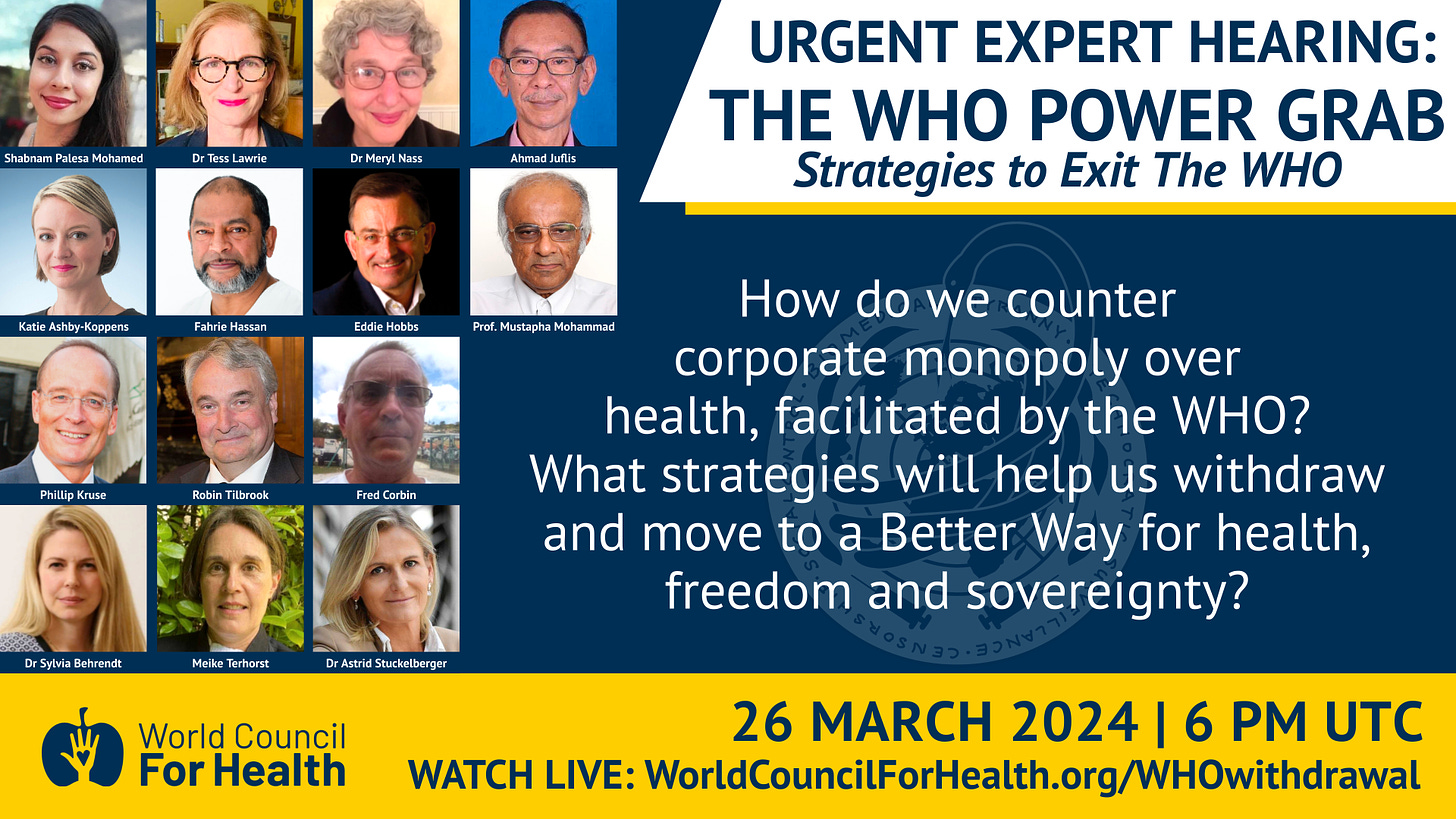Strategies to Counter the WHO Power Grab – Fact Finding Expert Hearing
Beneath the WHO's noble mandate lies a history marred by controversies, failures, mismanagement, and corruption.
As the world grapples with the aftermath of the Covid-19 crisis and is being propagandised on ‘Disease X’ to drive centralised monopoly, it is imperative to scrutinize disturbing developments at the World Health Organization (WHO) and to mobilise effective strategies to counter their power grab and re-establish democratic country governance.
The WHO, seen by some as a leading international health agency, shoulders immense responsibility in safeguarding global public health. However, beneath its noble mandate, lies a history marred by controversies, failures, mismanagement, and corruption. From the tobacco scandal, to accusations of nuclear cover-ups, and the H1N1 false pandemic drug sales campaign; the WHO's integrity faces scrutiny, rightfully raising challenging questions about its effectiveness and credibility. The WHO also performed dismally over the Covid-19 chapter. Thus the WHO’s conflicts of interest, integrity, processes, and scientific rigour face appraisal, rightfully raising questions about its effectiveness and credibility.
The International Health Regulations and the Pandemic Treaty or Accord
The WHO wields significant influence through instruments like the International Health Regulations (IHR) 2005. However, recent amendments to the IHR and proposals for a new pandemic treaty or accord spark dissent and amplify legitimate concerns about the WHO's funders and their approach to global health. The WHO facilitated amendments to these two instruments have resulted in member states, the public, organizations, health workers, lawyers, and politicians speaking up against health monopoly, debt, and human rights violations.
Critics of the controversial IHR amendments contend that they have unrealistic expectations, burden member states with debt, and transform the WHO’s role from advisory to governance. Skeptics of the new pandemic treaty raise concerns about its potential to undermine national sovereignty, infringe on civil liberties, and exacerbate existing inequities in access to healthcare. Both fail to address fundamental flaws in global health governance, including the unequal distribution of resources, power imbalances between developed and developing countries, and the influence of conflicts of interests, such as pharmaceutical companies and donor governments.
The WHO's International Health Regulations amendments and proposed pandemic treaty or accord demand rigorous scrutiny and critical engagement from civil society, governments, public health workers, and lawyers. The lack of meaningful national engagement with civil society and marginalized communities undermines the legitimacy and effectiveness of the negotiation process, reinforcing perceptions of top-down decision-making and exclusionary practices within the WHO. It is primarily for this reason, in addition to the WHO’s failures and conflicts of interest, that the the World Council for Health is obliged to present an Expert Hearing to:
a) Independently appraise the WHO’s conduct and processes
b) Discuss strategies to counter the WHO’s expansion of power
This Expert Hearing is taking place at 6 pm UTC on Tuesday 26 March 2024, and will be hosted by Shabnam Palesa Mohamed and Dr Tess Lawrie. Expert speakers include Dr Meryl Nass (USA), Fahrie Hassan (RSA), Katie Ashby Koppens (NZ), Phillip Kruse (Switzerland), Robin Tilbrook (UK), Fred Corbin (St Lucia), Dr Astrid Stuckelberger (Switzerland), Dr Sylvia Behrendt (Austria), Meike Terhorst (Netherlands), and Eddie Hobbs (Ireland). Public participation during the expert hearing will be encouraged. Meanwhile, you can share your strategies via email: LAC@WorldCouncilforHealth.org
A call to action for health, freedom and sovereignty
In light of these critiques, amongst many, and the extraction of resources from our countries, health freedom activists, civil society organizations, and governments must explore effective strategies to counter the WHO and to ensure integrative, transparent, and collaborative health.
Join the Expert Hearing on Monday 26 March at 6 pm UTC on the World Council for Health website: https://worldcouncilforhealth.org/whowithdrawal
If you are a member state delegate or a politician who would like to learn more and or hear civil society’s views on the WHO facilitated power grab, please email LAC@WorldCouncilforHealth.org.
Valuable Resources
WCH Policy Brief: Rejecting Monopoly Power Over Global Public Health (April 2023)
WCH Legal Brief: Preventing the Abuse of Public Health Emergencies (February 2024)
If you find value in this Substack and have the means, please consider making a contribution to support the World Council for Health. Thank you.





Even the Welsh First Minister (soon to be retired) has now said that lockdowns were a "failed experiment". And that's all it was, and what the WHO treaty will be, an 'experiment', guesswork even. If individual govts who took these decisions were such disasters, and they were, then imagine what a dictated central mandate will be like. Catastrophic. The WHO is the World Harm Order, and has no interest in health any longer. Govts must NOT sign up to this.
Everything related to the scamdemic has to be comprehended as a global coup d'état.
The strategy is the scamdemic.
It's true nature, relentless propaganda fed fear.
The weapon, the gene therapy.
The fifth column, the media.
The objective, global bankruptcy which will induce total takeover of personal and national assets.
The ultimate goal, " you will own nothing and will be happy ".
If you want to stop this, I urge you to think about complete yet peaceful strike.
Any other strategy will be ineffective.
PERIOD.